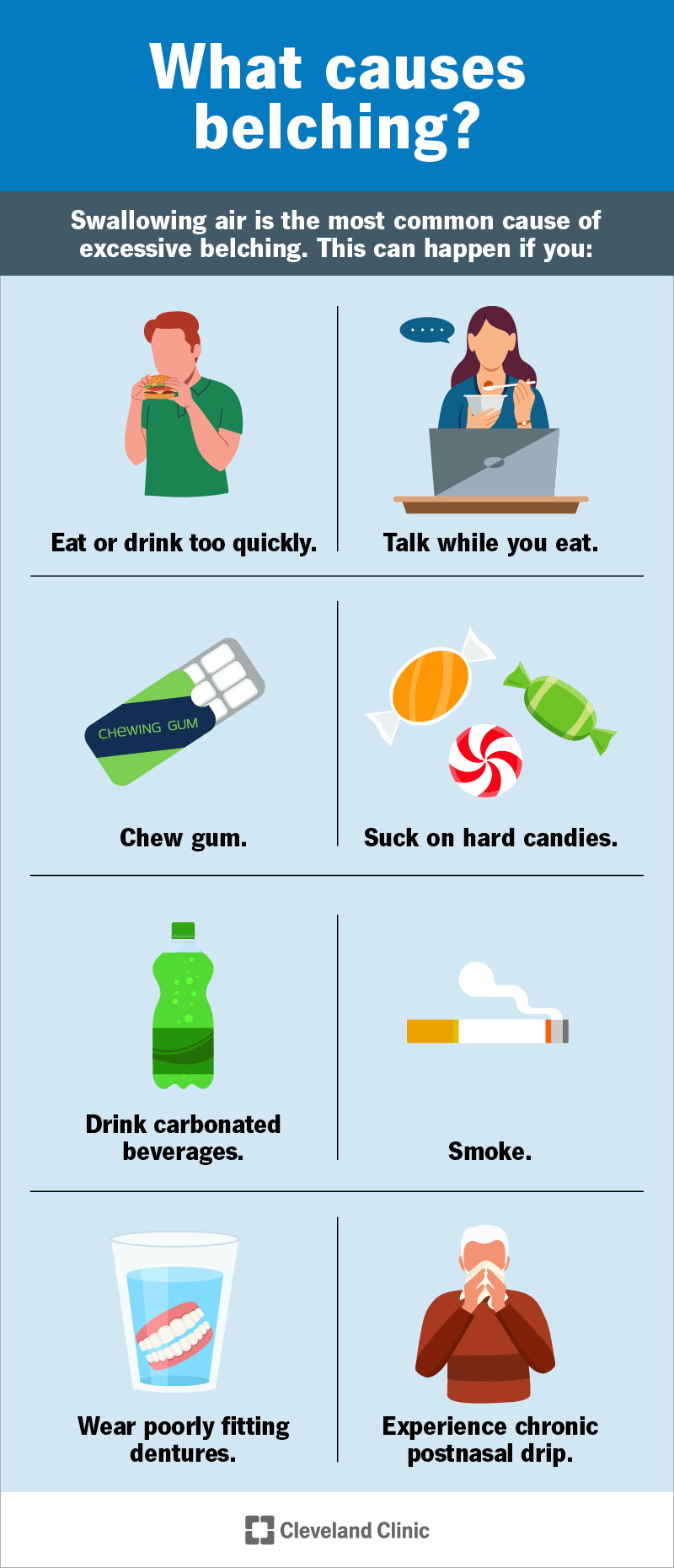Belching is a natural bodily process that results from swallowed air building up in your stomach. Causes range from swallowing too much air during daily activities like eating and talking to certain health conditions. Occasional belching isn’t anything to worry about. But excessive belching can be a sign of an underlying medical condition.
Advertisement
Cleveland Clinic is a non-profit academic medical center. Advertising on our site helps support our mission. We do not endorse non-Cleveland Clinic products or services. Policy

Belching (burping) is the natural process of air leaving your stomach through your mouth. Every time you swallow food or drinks, you also swallow air. This swallowed air stretches your stomach until it can’t hold any more. Then, a muscle at the lower end of your esophagus (the connection between your throat and stomach) relaxes so that air can escape from your mouth. This is a belch. Another name for it is eructation.
Advertisement
Cleveland Clinic is a non-profit academic medical center. Advertising on our site helps support our mission. We do not endorse non-Cleveland Clinic products or services. Policy
Everyone belches once in a while. It’s a normal bodily function that helps release extra air from your digestive system. Occasional belching is nothing to worry about. But excessive belching can be a sign of an underlying medical condition. If you’re concerned about burping too much, see your healthcare provider to rule out any medical causes.
Many factors can lead to excessive belching. These include taking in too much air, what you eat and drink as well as any underlying health conditions you have.
Swallowing air is the most common cause of excessive belching. This can happen if you:
Certain foods and drinks can also cause excessive belching because they’re difficult to digest or produce gas as a byproduct. These include:
Belching may be a symptom of certain medical conditions. To make a diagnosis though, your healthcare provider will look for other symptoms, as well. These conditions may include:
Advertisement
Belching is a natural process that typically doesn’t require treatment. But if you have excessive belching that doesn’t go away, you may want to see your healthcare provider to determine if you have an underlying health condition. Treatment will depend on your specific condition but may include the recommendation to avoid certain foods and drinks, including:
Your healthcare provider may recommend the low FODMAP diet. This eating plan cuts out certain foods that your body doesn’t absorb properly and that can result in gas symptoms.
Your provider may also recommend meeting with a dietitian for specific advice.
To relieve belching at home, you can try lying in a knee-to-chest position or on your side or until the gas passes. You should also avoid:
Typical belching doesn’t require treatment, but that can vary depending on the root cause.
Excessive belching can be a sign of a problem in your digestive system. If left untreated, it’s possible that your symptoms can worsen. You may also start to experience other symptoms until a provider diagnoses and treats the issue.
Belching is a natural process. But you can sometimes prevent it by avoiding items that are more likely to make you belch. To prevent belching, you can also:
Advertisement
Most of the time, belching isn’t a major issue. You should reach out to your healthcare provider if the belching doesn’t stop, or if you develop other symptoms like:
Belching itself isn’t a typical sign of a heart attack. Heart attacks usually present with a different set of symptoms, most commonly chest pain, shortness of breath, weakness or discomfort. But it’s very important to know there are many nontypical presentations of heart attack, and when in doubt, it’s best to check it out.
If you’re experiencing belching, it’s more likely due to something you ate or how you ate it. But it’s important to be aware of all your symptoms. If you have chest pain — especially if it’s severe, crushing or radiating to other areas like your arm or jaw — along with belching, then it’s best to err on the side of caution and seek immediate medical attention. Other symptoms of a heart attack can include:
Belching, though sometimes embarrassing, is a totally normal bodily function. It simply means your body is getting rid of excess air that built up in your stomach. An occasional burp is nothing to worry about and, in fact, it can actually help relieve bloating and discomfort. But if you have excessive belching, make sure to talk to your healthcare provider to make sure you don’t have an underlying medical condition.
Advertisement
Last reviewed on 10/31/2024.
Learn more about the Health Library and our editorial process.